Menu
Crossroads
Research on Queer People of Colour in Cork
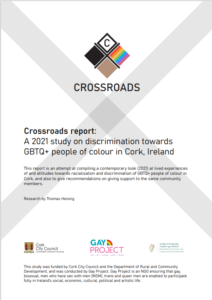
Crossroads Report:
A 2021 study on discrimination towards GBTQ+ people of colour in Cork, Ireland.
This study was funded by Cork City Council and the Department of Rural and Community Development, and was conducted by Gay Project.
This report is an attempt at compiling a contemporary look (2021) at lived experiences of and attitudes towards racialisation and discrimination of GBTQ+ people of colour in Cork, and also to give recommendations on giving support to the same community members.
To download the report click here.
Are you curious about racism and how it manifests? Then do explore this page:
Crossroads is a Cork-specific resource for LGBTQIAP+ People of Colour (POC) who are unsure about their place in Cork’s queer community and who find themselves experiencing forms of racialisation in Cork.
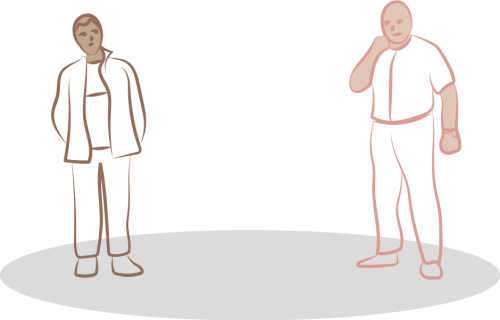
In summary, racial and xenophobic discrimination creates divisions in society and distracts from current and actual issues which we could all work towards.
It is not simply about how to 'stop being racist'
Constructively and genuinely discussing racism requires us to review the ways we see other people and society. We are all in possession of the strong bias that people of colour are secondary to white people. We hold people of colour to a higher regard of how they should be, act or represent out of stereotypical ideas of what a person of colour is, or/and out of an idea that they should be grateful to be in Europe. We are taught this in schools, through media and politics, and it can be inherited through generations.
This is also true in the LGBTQIAP+ community – we live in the same society after all. During the 1969 Stonewall riot and movement in New York, a lot of those who championed alliances, movements and protests for the equal rights of LGBTQIAP+ people, were gay, lesbian, gender non-conforming and trans people of colour. However, these groups are today some of the most vulnerable in the community.
In today’s queer community, people of colour are positioned secondarily to white people in the queer community. This is evident as a person of colour but hard to see if you are ‘white’. It is mostly unconscious because this strong concept of whiteness.
As we are speaking, there are people of colour in our community who are contributing positively to their surroundings, workplaces, schools and to our society. In Cork, we can appreciate many good things, including the absence of ‘ethnically’ ‘ghettoised’ areas.
So, while people should be able to express and focus on their cultural and religious circumstances in their own environment, we have to make them also feel welcome in wider society. There are more LGBTQIAP+ people in Cork than you think, but many don’t mix with the white majority because of strong experiences of racialisation or othering.
We don’t need you necessarily as a friend or partner, but we do require respect and a realisation that our reality is different. We can help ourselves, but at times, some allyship is appreciated. Just as we like to ask straight people of the same.
Read if You Identify As A Person Of Colour (POC)
Are you a POC who identifies within the LGBTQIAP+ living in Cork?
It can be taxing navigating a European society as a POC encountering discrimination and regular moments of othering. These issues manifest in particular within the white LGBT+ community in Cork where many people of colour don’t feel readily accepted by or a part of. There is progress being made and attitudes are changing, but this still doesn’t mean that it is easy to be a BIPOC individual.
We need alliances and to have a fulfilled sense of belonging to function in the modern world. For many POCs, social media has provided great platforms and forums to connect, network and source empowerment. But when it comes to physical spaces for empowerment and social connections, it can be extremely hard.
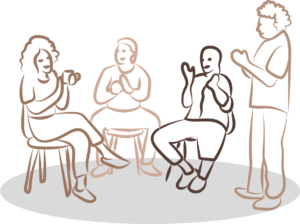
Empowerment:
Empowerment manifests differently for everyone, but through it it becomes easier to live with or even confront trauma from lifelong discrimination. It can be achieved from external or internal sources.
For some people, empowerment occurs through personal achievements in sports, hobbies or work. For others, it is achieved in solidarity with other POCs or other Queer POCs. The important thing is that we remember that we all deserve good things in life, and that we all deserve to contribute to the queer community and wider society. In a sense, you can call it ‘believing in yourself’ or believing in your identity marker as a POC.
Self-care is an easy buzzword to throw around, but it is essential that it is taken seriously in the context of empowering yourself as a minority. Finding your form of self-care is all up to you, and it is important to differentiate between coping mechanisms and things that intrinsically and wholesomely make you feel better as you.
Exercising, saying no, expressing gratitude, eating healthy, being surrounded by supportive people and drinking water are forms of self-care all people need. Coping mechanisms include instant gratification such as alcohol consumption, eating sugary foods you know are bad for you and binging social media. These may seem enjoyable in the moment, but do not contribute to your quality of life and are therefore not forms of self-care. They may even make you unhappier overall.
This may seem preachy or perhaps unnecessary to consider for some of you, but for individuals who already have a lot to deal with, taking care of yourself in mindful ways will make great positive differences. This is not to say that the world around us shouldn’t be changed as well. We still need to advocate for more inclusive policies and institutions and better representation of people of colour. But this work is easier when you have fewer battles to fight in your own life.
Besides this, there is not a whole lot of resources for POCs in Cork… yet! In any case, we always encourage people
reaching out to other groups of colour and to follow sources of empowerment. One that is currently very active and also LGBTQ+-friendly is Black and Irish:
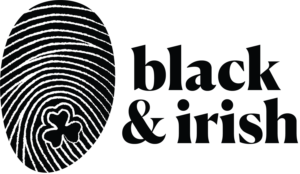
‘Black and Irish’ is an organisation in Ireland dedicated to furthering and empowering people of color in Ireland. During Pride Week 2021, they featured a week’s content presenting LGBTQ+ people of colour from across Ireland. They are aware of issues specific to the LGBTQ-community of colour, but do not offer services dedicated to this. Instead, we urge you to give them a follow, and check out their interviews, social media content and podcast.
Read If You Identify As White:
If you are curious as ‘white’ person, how issues pertaining racism manifest, this text is one of many trying to nuance this. What is specific to the following take on ‘racism’ is that it considers issues and attitudes expressed by LGBTQ+ people in Cork.
First, there are two things that are important to understand:
1) Issues pertaining racism and racialisation do take place in Ireland and in the Irish queer community every day. POCs in Ireland are daily being called n****, being treated as inferior, seen as problematic, and much more. Denying that these occurrences take place makes you a part of the problem.
2) The words ‘racism’ and ‘race’ are problematic. ‘Race’ is a perceived and social phenomenon and does not manifest biologically. You will see the term expressed every day in media as if people belong to ‘white’, ‘black’, European, Asian or African races. Describing someone as belonging to a ‘race’ is called ‘racialisation’ and the act of racialising is part of the problem as you will read further below.
How do we talk about racism?
Talking about racism is not about crippling people with guilt. It is about demanding respect, having the same opportunities as everyone else (equality), and being able to navigate any space without having one’s identity undermined. It is also about questioning and improving the society we have – for everyone involved, also ‘white’ people.
“Racism” is a hard term to grasp. It is further a problematic term as it assumes ‘race’ is a tangible concept. Truth is that there is no ‘black’, ‘mixed’ nor ‘white’ race. So, when discussing ‘black’ and ‘white’ as social groups, we base these distinctions on similarities in cultural affinities and our complexion of our skin and hair. However, people are much more diverse than this.
POCs are all different and it is important to remember that. Our lived experiences are different, and we cannot describe all our levels of tolerance, backgrounds or perspectives with a single webpage. Some POCs in Ireland don’t experience racial abuse or discrimination often, while it is a regular reality for others.
That being said, there are some tropes that POCs often experience:
Tropes that people of colour experience
Trope: “I don’t know what to call you guys!”
You don’t have to find a term to describe us. “People of colour” works to a large extent here in Europe where people of colour are a minority, but in some contexts in Central Africa it can seem alienating. And despite the perceived neutrality of the term, some people don’t like being referred to as “people of colour”, while others use it all the time. You don’t have to search for a term to segregate people, so refer to someone by their name or nationality.
Trope: “People of colour seem to take offense to a lot of things…” or “You guys seem so angry…”
This often comes from people who have not been subjected to lifelong discrimination or harassment. People who have never had their identity being undermined publicly or have felt alienated because of their cultural heritage.
POCs have an incredible amount of resilience. But we are also allowed to be emotional, to request respect and equality and to fight intolerance.
Trope: “Is it like when white blonde/red-haired/brown-haired people get discriminated?“
Discrimination manifests in all corners of society. It would be hard and likely impossible to get rid of all our biases. But we can control our actions. We all have visual and auditory characteristics which people judge us for. What is different with racial discrimination is how systematised and ingrained it is into Western culture and society. Therefore, it is hard to find an equivalence to racialisation.
Trope: “I don’t see colour.”
Trust me, don’t use this sentence.
Why should you care as a white person?
Our current society teaches us that white people are smarter, more loyal, more employable and socioeconomically more viable. These sentiments are also present in Ireland. We have a strong sense of European superiority which also aligns with a strong sense of European as being ‘white’. This is expressed in how we view people moving from Global South-countries (migrants) vs. from other Global North-countries (expats). The presence of non-White people in Europe is seen as a peculiarity or sometimes even a problem.
Recently, Europe is seeing a strong surge in right-wing sentiments in Europe politics which fuels this European/white supremacy. We are constantly describing our times as progressive (“how can this happen in 2021?” or “Are people still like this?!”), but in reality racial abuse and violence is still a daily occurrence in many parts of Global North society. In Ireland, things are perhaps better than in many countries, and there is fortunately an interest in discussing racism (so thank you if you are reading this!). But we can still do better, especially since we champion our part of the world as progressive and socially contemplative.
However, we talk so little about how destructive and costly it is for European societies to let discrimination, intolerance and right-wing politics influence people negatively and drive institutions and legalisation.
A culture of discrimination undermines productivity and solidarity in our society. It creates trends of political skepticism, anti-establishment discourse and fascist tendencies. As we have seen with Brexit and Trumpism, racial discrimination and xenophobia (fear of people coming from outside countries) are part of these movements, but we need to realise that people of colour and migrants are not the only ones affected negatively by right-wing politics and legislation.
The right vs. left debate is not a matter of differences, they are reactions to systems of European self-entitlement, segregation and a strong idea of whiteness.
‘Whiteness’ does not try to explain the light skin colour of some people, but is instead an idea or strong notion of social status that people with light skin colour tend to align with.
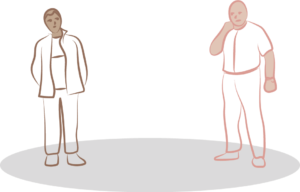
As an example illustrated above:
a ‘white’ lower middle class grocery store owner in Ireland named John has just watched the news and seen Boris Johnson talk of sovereignty and closing borders. John can a strong sense of relatability or sense of whiteness from watching Boris, even if John does not self-identify as a xenophobe or a bigot. In John’s neighbourhood lives Masoud, who has Iranian heritage, has brown skin, but is also a store owner and of lower middle class. John’s relatability to Boris makes him not see the similarities between himself and Masoud despite them both sharing the same socioeconomic status and issues. After all, it is better to be on ‘higher ground’.
This is whiteness – a strong sense of alignment that people who identify as white people have with other white people centered around superiority and entitlement. Blackness might be the black equivalence; however, whiteness is the concept currently in power that fuels the movements of European right-wing politics. For the sake of whiteness, the xenophobic aspects of Brexit and Trump’s popularity were driven by discourse on whiteness.
What can I do specifically as a white person?
First and foremost, challenging one’s attitude and way of thinking is key. Instead of feeling bad or guilty when realising that one has racist issues, remember that we are all taught through school and media to be racists in society. We are taught to think of people of colour as lesser. And people of colour are taught the same. Here are a few things you can consider:
1) Don’t hold people of colour to a standard that you are comfortable with. For example, realise when you expect people of colour to behave in a ‘white’ way. Are you expecting a person of colour to have a clear European English accent, to socialise in the same circles as yourself and to dress and carry their hair as ‘white’ people do?
2) Do you still feel that there are natural and biological reasons for why black/Middle-Eastern/mixed/etc. people perform socioeconomically worse than white people in certain sectors? Further, do you feel that there is a completely biological explanation behind the idea of people or colour being bad swimmers? Then there is room for exploring the topic further for you. We recommend Emma Dabiri’s book: What White People Can Do Next: From Allyship to Coalition. It is a rich and encompassing book for its size, and while it isn’t queer-focused, it provides a lot of information for you who requires an enlightening take on the topic.
3) Remember that ‘race’ is a social concept we have invented as a way to divide people. It has no bearings in biology.
4) And finally, be realistic. There is no way that we are going to undo all of the racist/racialising mentalities we possess. None of us are without racist mentalities. Even as POCs, we have to undo a lot of self-hate and hate for other POCs because the same society and culture taught us to do so. What we can do is to not be afraid of the discussion.
